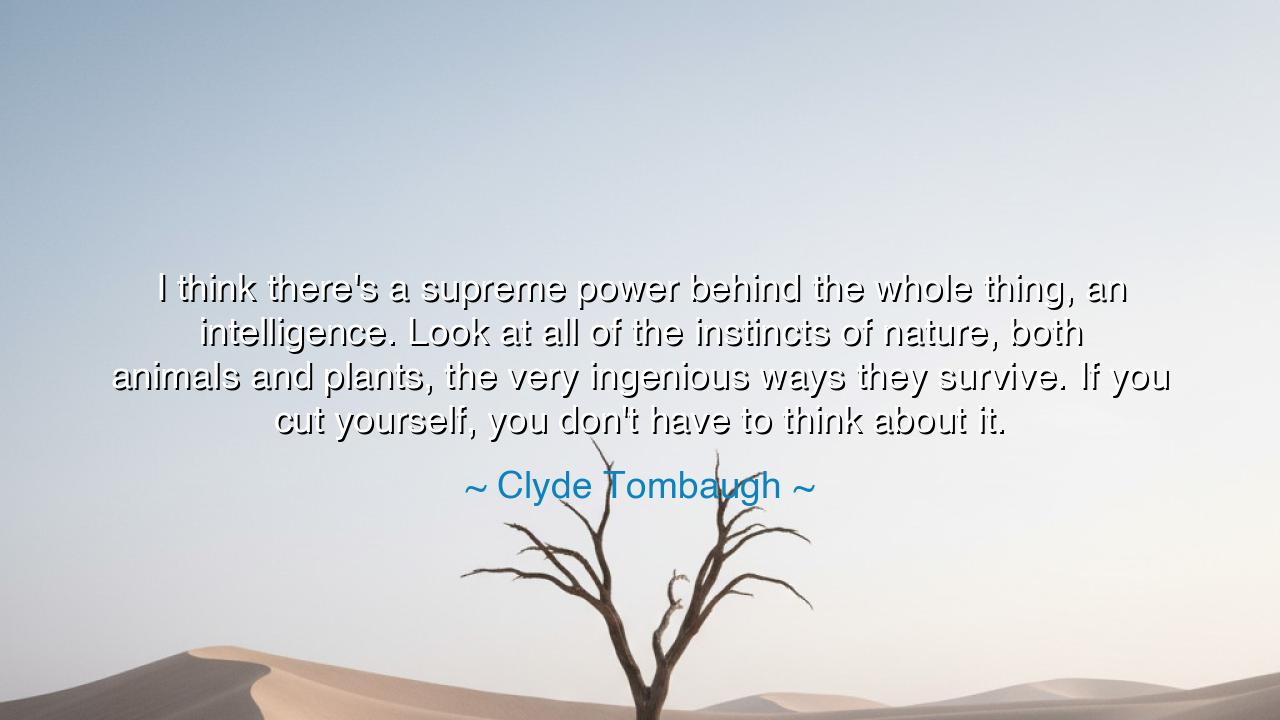
I think there's a supreme power behind the whole thing, an
I think there's a supreme power behind the whole thing, an intelligence. Look at all of the instincts of nature, both animals and plants, the very ingenious ways they survive. If you cut yourself, you don't have to think about it.






“I think there’s a supreme power behind the whole thing, an intelligence. Look at all of the instincts of nature, both animals and plants, the very ingenious ways they survive. If you cut yourself, you don’t have to think about it.” Thus spoke Clyde Tombaugh, the humble astronomer who peered into the heavens and discovered Pluto, a world unseen by human eyes for all the ages before him. His words, simple yet profound, speak not from the cold equations of science, but from the awe of understanding — that sacred moment when intellect bows before mystery. Here is not the arrogance of discovery, but the reverence of realization: that behind the grand design of existence, from the turning of galaxies to the mending of a wound, there moves a hidden intelligence, a supreme power whose wisdom transcends the reach of reason.
Tombaugh, a man of science and faith in inquiry, gazed across the vast emptiness of the cosmos, and what he found was order, not chaos. He saw that the universe, in all its immensity, was not a random scattering of stars, but a tapestry — intricate, harmonious, purposeful. His discovery of Pluto in 1930 was a testament to human perseverance, yet his reflection reminds us that human achievement itself may be but a mirror of a greater intelligence woven into the fabric of existence. The instincts of nature, the self-healing of flesh, the migrations of birds, the blossoming of seeds — all these are not accidents, he suggests, but signs of a living design that breathes through all creation.
In his words, Tombaugh joins the company of those ancient seekers who saw divinity within order. From the philosopher Aristotle, who spoke of the “unmoved mover,” to Isaac Newton, who believed that gravity itself was the handwriting of God, humanity has long sensed that intelligence is not confined to human thought, but embedded in the world itself. To observe nature is to witness mind in motion, to see purpose manifest in instinct, and to understand that the line between the scientific and the sacred is far thinner than pride allows us to admit. Tombaugh, with a scientist’s eye and a poet’s heart, calls us back to wonder — to look upon the ordinary and perceive the infinite intelligence within it.
Consider the tiny spider, spinning her web in the darkness. She does not study geometry, yet her lattice of silk is perfect in symmetry and strength. Or the monarch butterfly, journeying thousands of miles toward lands it has never seen, guided by an instinct no map could teach. Even within ourselves, as Tombaugh reminds us, the body knows what the mind does not. “If you cut yourself, you don’t have to think about it.” The blood flows, the cells repair, the wound closes — all without command, all without thought. This silent harmony, this innate wisdom of life, speaks of an intelligence that acts not through words, but through being. It is the music of existence, playing through every creature, every leaf, every heartbeat.
Tombaugh’s reflection is not a doctrine but an invitation — to humility. For too often, humanity has mistaken knowledge for dominion, forgetting that understanding the laws of nature does not mean we wrote them. The scientist, at his purest, is a priest of creation, uncovering the patterns that were always there. Tombaugh’s reverence for this unseen intelligence is a reminder that science and spirituality are not adversaries, but two paths to the same summit. The telescope and the temple both gaze toward the eternal — one outward into the stars, the other inward into the soul — and both find order, beauty, and mystery awaiting them.
There is also in his words a lesson about trust. Just as the body heals without conscious thought, so too does life often unfold according to patterns we cannot fully perceive. When storms arise, when plans falter, when the road bends beyond sight, there is wisdom in remembering that the same intelligence that guides the stars also guides the seasons of our own lives. This is not blind faith, but faith born of observation — the recognition that even chaos has its rhythm, that from decay arises new growth, and that the universe, though vast and indifferent in appearance, yet moves toward balance and creation.
Therefore, O listener, take this truth into your heart: the intelligence that shapes the cosmos also dwells within you. When you act with creativity, when you solve with intuition, when you heal through love, you partake in that divine design. Seek knowledge, yes, but let knowledge deepen your reverence; question boldly, but let your questioning lead you to wonder. Look upon the world — the instinct of the bird, the wisdom of the tree, the healing of your own body — and see that life itself is the language of intelligence.
In the end, Clyde Tombaugh, discoverer of distant worlds, reminds us that the greatest discovery lies not beyond the stars, but within the understanding that all things — from the smallest cell to the widest galaxy — are bound together by an unseen mind, an eternal order, a supreme intelligence that speaks through the silence of creation. Let this awareness humble and uplift you, for to live in harmony with that intelligence is to live wisely, bravely, and well — in awe of a universe that not only exists, but knows.






AAdministratorAdministrator
Welcome, honored guests. Please leave a comment, we will respond soon